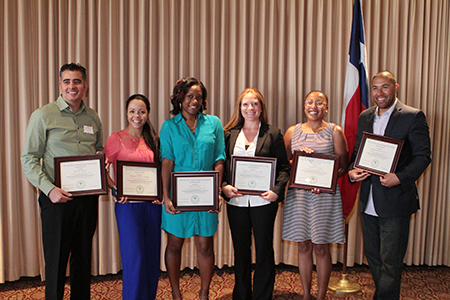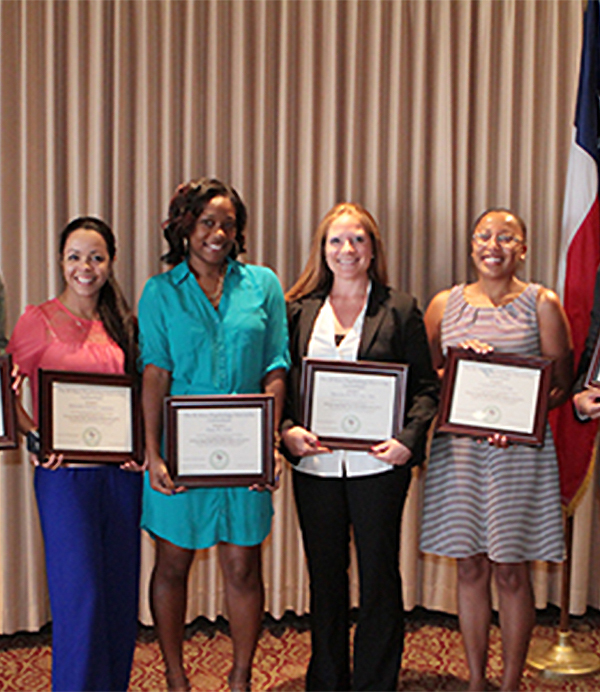By Laura L. Acosta
UTEP News Service
The first six doctoral psychology graduates from the El Paso Psychology Internship Consortium (EPPIC) will heal people, transform systems, bring compassion and integrity to where they work and live, and touch numerous lives for years to come, said Octavio Martinez, M.D., executive director of the Hogg Foundation, at EPPIC’s graduation ceremony July 29 at the El Paso Club.
EPPIC is a collaborative partnership among The University of Texas at El Paso, Texas Tech University Health Sciences Center (TTUHSC) and William Beaumont Army Medical Center (WBAMC) that was formed in 2012 to provide a comprehensive training program for doctoral interns in psychology in order to prepare competent psychologists and effective multicultural therapists.

The partnership is made possible by more than $750,000 from the Hogg Foundation for Mental Health and the Paso del Norte Health Foundation.
“I know you will make a difference,” Martinez told graduates. “You’ll help us create a better, more equal society for all of our nation’s people. As you move on to the next steps, I hope you draw sustenance from what you have seen and done here in El Paso.”
Danielle Ciccone, Cassandra Jennings, Darisabel Roman Laureano, Edward Pacheco III, Ricardo Torres and Stacy Tylor are the first cohort of students to complete the one-year internship.
The students hail from Florida, California, Hawaii, Illinois and New Mexico. They were selected for the internship through National Matching Services Inc., which places applicants into psychology internship positions at training sites in the United States and Canada.
“The psychology internship consortium allows us to capitalize on the relative strengths of participating organizations to provide a comprehensive training experience for our interns,” said John S. Wiebe, Ph.D., associate provost at UTEP. “We’re excited about the capacity of the program to draw talented young professionals from across the country to the border region, and to allow those who grew up here to return to El Paso to complete their psychology training.”
Over the course of the year, students performed various tasks in order to refine both their counseling skills and their professional identity, explained Brian Sneed, Ph.D., EPPIC training director.
Training sites included UTEP’s University Counseling Center, TTUHSC’s Department of Psychiatry and WBAMC’s Department of Behavioral Health.
As part of their training, students provided psychotherapeutic services to the community and participated in prevention programs. They also participated in research projects and professional presentations. Assignments were done under the supervision of licensed psychologists and other training staff.
“You (the students) were evaluated on everything that they did every step of the way,” Sneed said. “But I need to let you know that you met the challenge and you did great and we are confident that as you move forward into the next step into your professional career, that you will make a difference and you will add to professional psychology.”
Ricardo Torres earned his Ph.D. in counseling psychology from New Mexico State University. The California native’s EPPIC training site was the University Counseling Center.
“We performed campus services in the form of individual counseling and psychological assessment evaluation,” Torres said. “We also reached out to the campus and provided outreach.”
Torres said his time with EPPIC helped to solidify his therapeutic skills and prepare him for the next step in his career, which includes a postdoctoral fellowship at The University of California at Berkley, where he will be working as a university psychologist.
Octavio Martinez said EPPIC was a model for Texas and the entire nation for three reasons.
“One, it is training psychologists in one of the most underserved regions in the state,” Martinez said. “Two, it is training them to serve a culturally, linguistically diverse population, not to be underestimated considering the diversity of the U.S. and where we’re going. And three, it’s going through a pioneering collaboration between two universities, two foundations and a United States military medical center.”
Darisabel Roman Laureano was the only student to intern at TTUHSC’s Department of Psychiatry, where she performed research, psychotherapy and consultations, and had the opportunity to work with psychiatrists.
“I feel more prepared in the multicultural aspect and linguistic aspect as well,” said Laureano, who plans to return to El Paso after she finishes her dissertation at Carlos Albizu University, Miami. “I feel like I can go now outside and work basically any place. I have done so many things that a psychologist can do that I feel really well prepared and well trained. It was an awesome experience.”
